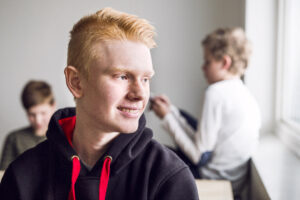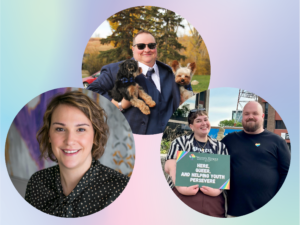Happy Social Work Week!
There are a lot of social workers here at Wood’s Homes – over 70 of us, in fact. With so many of us walking through so many doors of the so many programs and services throughout the day (and night), it is no surprise that social work values are reflected in our agency values. So, too, does social work practice influence our collective practice.
Reflective practice is a cornerstone of social work practice. In short, reflective practice is an iterative process whereby the individual reflects on their work (and the work of their team), critically evaluates it (the good, the bad, and the ugly), and incorporates the subsequent learnings into their future work.
Reflective practice is the underpinning of good post-crisis work, good supervision, good leadership and good clinical work. However, reflective practice can also be painful. If you aren’t intentional (and sometimes even if you are), your inner defender can squash the process…or you can get sucked into a shame hole. Over time, though, it pays off in spades.
In considering our agency’s safety journey over the last couple years, the pain and pay-off of reflective practice is clear. It hurt to look in the mirror – especially at first. Nevertheless, over time, it became easier. The processes and opportunities for reflective practice took hold and propelled us forward.
Look how far we’ve come.
So, in the spirit of social work week, consider your own reflective practice. For inspiration, please enjoy Josh Golding’s account of his own reflective journey and his tips on the very difficult task of changing your own mind.
- Kathleen Rhodes, RSW, Wood’s Homes Program Manager
How to change your own mind
Well, it can be hard. Sometimes very hard.
I used to work in an environment where hands-on interventions were used frequently, were backed by some theory, and were a natural, baked in part of the work culture. That placement being my first full-time job in this field, I jumped in with both feet. Whether a reflection of my own insecurity or simply a good fit for my need for control in my environment, I readily adopted (and soon promulgated) this way of doing things.
Within a year, I found myself in a new environment doing a similar job. Upon arriving there, I was heralded as the “expert” in this line of work, there to “rescue” the program from its dire state. Only in hindsight, and after much (often painful and distressing) reflection, have I been able to clearly see what was going on for me at the time.
From the start, it was clear that my operating principles and lines of thinking around hands-on interventions weren’t working the way they had in my old environment (for now, I will leave aside the question of whether they truly worked there). I found myself both in, and creating, situations with clients that escalated further than necessary.
The stress was mounting: I was stressed, feeling very insecure and alone. I was in conflict with my work partner; our relationship, which had never been great, was getting progressively worse. My relationship with my hardest clients – the ones with whom I was using hands-on interventions - were also in shambles.
So I did what any normal person would do: I doubled down.
When my arguments and justifications weren’t convincing others (or myself, in hindsight), I made them louder, to more people, with more (and bigger) words. That I am articulate and well-read only helped me make smarter justifications. It didn’t matter that the trainings and theory I was learning were in direct contrast to some of my held opinions. I needed to be right.
The breaking point came just before Christmas break one year. The day before the break we had a terrible situation in our classroom with one of our kids that escalated out of control (due in no small part to some of my actions). My own part became absolutely apparent. The day ended horribly, and the most agonizing Christmas break began. I could not truly rest because I was finally coming to face within myself that my paradigm and actions were not only not helping: they were likely perpetuating harm.
The pain of holding on to my old ideas became greater than the pain of changing.
Isn’t that true for most of us?
Still, upon reflection, this was baffling. I had argued for ideas that I no longer even believed, and shied away internally from this reality while so doing. The distress was untenable, and my inner world was fragmented. Things needed healing and rebuilding, both within myself, and within my workplace.
It was painful. And tearful. Several therapy sessions and many supervisions later (thank you to those wonderful people), I was able to see a shift within myself. My own mind (and heart) began to change.
What first allowed me to do so was the care of the aforementioned people. They saw me, not as some monster (as my inner critic was telling me), but as a kind and caring person with some misguided ideas. They held a positive view of me, and thus created space for me to hold a positive view of myself, and my intentions. This, it turns out, is important if you’re going to change your mind.
With compassionate reflection, I came to recognize how tightly my identity had become bound to being right. I had been heralded as the “expert.” I thought this meant having the answers; and that having the answers would mean that I would be “enough” (whatever that is).
Disentangling my sense of self from my beliefs was integral to letting go of those false beliefs, the ones that were no longer working. I began to find a sense of self that was sufficient, completely separate from whether I was right or wrong about a given thing.
A new sense of self began to emerge, one that includes my story and process in its fullness, but also transcends it. I have released some old ideas, but am not shaming the person I was for having his process.
I’m fascinated by this experience that I’ve had: why it was so hard for me to change my mind. Although this has been a journey of the heart for me, it’s also intellectually interesting, and I’ve done some deep digging and reading on this. A few thoughts, then, of which I remind myself:
- Remember that you are good. Find a positive sense of self upon which you can stand, and move from that place.
- Your beliefs are not your identity. Instead, tie your identity to how you think, not what you think. Learn to think like a scientist, not a sports fan, lawyer, or zealot. Or, to word it differently, focus less on having the right belief, and more on getting the right process down. Then the right beliefs will come.
- Become comfortable with the phrase: I don’t know. Form your opinions thoughtfully, and hold them loosely. You are probably a true expert in only a couple things, at best. And you need not know everything to be effective as you work with others.
- Notice – with compassion - your own tendency toward defensiveness when encountering information that challenges your beliefs. As you pay attention, your inner contraction may naturally release, and you may become more open to the new information.
- Listen more than you speak. You’ll learn more this way. True expertise is generally not the loudest in the room.
- When you hear the lawyer in your head start defending a point to an imaginary jury, take a breath. Your so-called “reasoning” is almost certainly motivated, and this is a good time to check your biases.
- Thank others for challenging your beliefs. This is how you can gain a view of the world which is increasingly accurate and useful. When the facts change, it’s ok to change your mind. When you learn new things, it’s ok to update your operating system.
- Lastly, go easy on yourself. You are in flux, in process, in progress. You are not the same person you were five years ago, five months ago, or even five minutes ago. You have the ability to change.
References (in order of appearance):
The Cozy Robot Show (formerly Ask Science Mike), Episode 159: The Art and Science of Changing Minds
Making Sense with Sam Harris, Episode 261: Belief & Identity (A Conversation with Jonas Kaplan)
Wait but Why blog by Tim Urban: The Thinking Ladder
The Knowledge Project, Episode 112: Adam Grant: Rethinking Your Position




